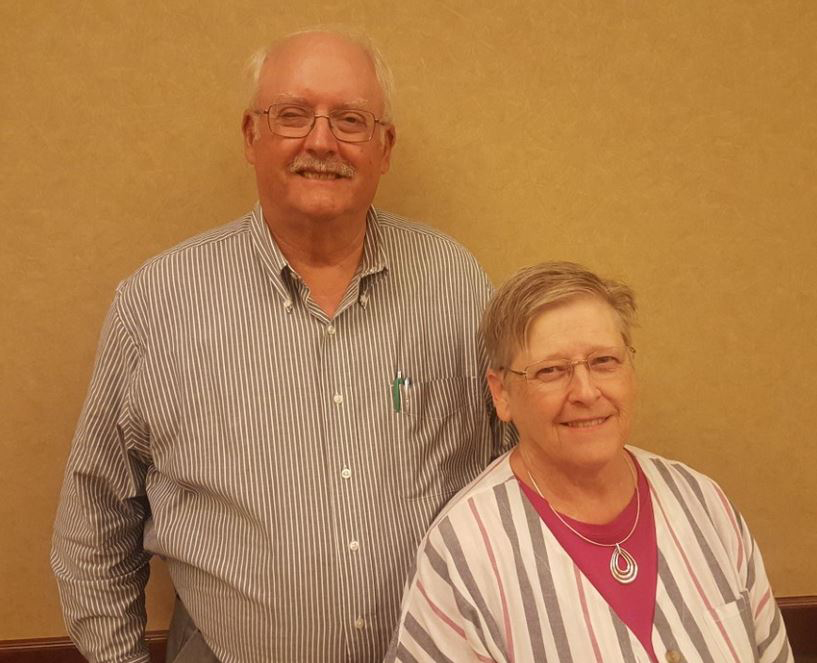
Left to right: Phil Knox and Sharron Knox | Download this photo
Kansas Profile – Now That’s Rural: Phil and Sharron Knox, AgSun
October 2, 2019
By Ron Wilson, director of the Huck Boyd National Institute for Rural Development at Kansas State University.
Would you like corn flakes for breakfast? Cows would like corn flakes for breakfast, too. Today we’ll learn about an innovative Kansas farm family that is utilizing a steam flaking technology to improve feed quality for their livestock operation and others around Kansas.
Phil and Sharron Knox farm in northwest Kansas. Phil is a native of the Brewster area. He went to Kansas State and majored in agricultural economics. While attending a Farm Bureau scholarship dinner, he met Sharron who was studying dietetics. The two married and began a long life together.
Phil went on to earn a master’s and Ph.D. in agricultural economics from the University of California at Berkeley, where Sharron earned her master’s in public health nutrition. She worked as a consulting nutritionist and Phil took a position as assistant professor at Colorado State before moving back to his family farm near Brewster.
Today, the family farming operation consists of no-till corn and wheat on 9,000 acres of which 1,800 acres are irrigated. They also have a 200 head cow and calf operation on 2,100 acres of pasture land. The cattle are finished, along with purchased calves, in a 2,500-head feed lot. The fed cattle are marketed through the Knox’s membership in U.S. Premium Beef.
“You have to do things a little better, you have to change,” Phil said.
“He does research, he has ideas,” Sharron said. “I’m a detail person.”
One of Phil’s ideas was to improve the feed efficiency of his cattle feeding operation. “I talked to a friend who was working in feed technology,” Phil said. That led to the creation of a steam flaking enterprise in 2004.
Feed corn is converted into flakes by processing in a steam chamber. This breaks down the cell walls and gelatinizes the starch. The result has proven to be a highly desirable cattle feed. In fact, the feed worked so well that the Knoxes not only feed the flakes to their own cattle, they market the flakes to other feedlots and dairies in western Kansas.
The flaking business is known as AgSun LLC. The company’s flakes have been shown to be a better source of energy than rolled or ground corn because cattle digest and utilize the flakes better. For feeder cattle, the flakes allow up to a 15 percent improvement in energy values.
For dairy cattle, starch availability is also improved, giving cows a better source of energy. This produces more energy for more milk production.
AgSun LLC has the capacity to process 2.5 million bushels of corn a year, with one third of that coming from the Knox’s own production. Their son Daniel, an industrial engineering graduate of K-State, helped design the automated controls and programming for the equipment. It is a state-of-the-art, computer-operated facility. The production from the plant could feed up to 40,000 to 50,000 head per day.
“The staff at AgSun is hard-working, friendly and always willing to help us,” said one customer. “The flakes are the best quality for our cattle.”
Another customer commented: “The quality of the product is second to none and is always very consistent. AgSun produces what they advertise and they do things the right way the first time. Our production is always good with AgSun’s cornflakes in our ration. We appreciate their service.”
Sharron is a board member of the Northwest Kansas Farm Management Association. Phil has served on the Northwest Kansas Groundwater Management Board. They are members of Kansas Farm Bureau and Kansas Corn Growers.
“We felt called to do more,” Phil said. He also serves as the volunteer pastor at the local Lutheran church.
“We enjoy living here, it’s like a big family,” Sharron said. Brewster is a rural community with a population of 305 people. Now, that’s rural.
For more information about the steam flaking business, see www.agsunllc.com.
Would you like corn flakes for breakfast? So would your cattle. We commend Phil and Sharron Knox for making a difference with agricultural entrepreneurship. Corn flakes can help make a better breakfast, better beef, and better business.
Audio and text files of Kansas Profiles are available at http://www.kansasprofile.com. For more information about the Huck Boyd Institute, interested persons can visit http://www.huckboydinstitute.org.
----------------
The mission of the Huck Boyd National Institute for Rural Development is to enhance rural development by helping rural people help themselves. The Kansas Profile radio series and columns are produced with assistance from the K-State Research and Extension Department of Communications News Media Services unit. A photo of Ron Wilson is available at http://www.ksre.ksu.edu/news/sty/RonWilson.htm.

